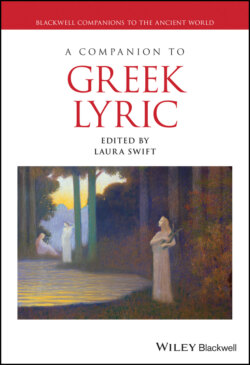Читать книгу A Companion to Greek Lyric - Группа авторов - Страница 34
IV Elegy and Epic on War 2: Simonides and Archilochus
ОглавлениеA more straightforwardly heroic example can be seen in the famous “Plataea elegy” of the late sixth- and early fifth-century author Simonides of Ceos (frr. 10–17 [+18?] W2), which deploys the story of Greek victory in Troy as a direct comparison for the recent triumph over the Persians in the eponymous battle (479 BC).21 The first extant portion seems to be addressed to Achilles (see esp. fr. 10.5), introducing this poem with an elegiac version of the epic proem-hymn which opens the Theogony (1–104) and Works and Days (1–10), here directed at Achilles; this is closed with the standard hymnic transitional farewell to the god and introduction of the current or next poem, viz. the battle of Plataea itself (fr. 11.19–21). Between those points, the poet summarizes Achilles’ involvement in the Trojan War, but the text is insecure and its story selective: Simonides mentions the hero’s death at the hands of Apollo (lines 7–8), the responsibility of Paris (9–11) and the “chariot of justice” which destroyed the city (12), and the journey home of the Greeks from Troy (13–14), before a transition to talking about the “undying … glory” (15) which they earned through Homer’s poetry (15–18).
Simonides naturally uses epic vocabulary, such as ἀοίδιμον (“worthy of song” fr. 11.13) and ἡμ]ιθέων (“demi-gods” 18), but he also sprinkles in some decidedly non-epic words (ἁγέμαχοι “leaders of battle” 11.14) and phrases (θείης ἅρμα … δίκ̣[ης “chariot of swift justice” 11.12). The poet also creates what looks like an epic formula (ἀθά]νατον … κλέος 11.15), using it again in the Persian narrative section (11.28), but it is in fact not evidenced before him nor again until Bacchylides (13.32); when Simonides uses the epic collocation of “trusting in the gods’ signs,” the precise form (θσῶν τεράε]σ̣σ̣ π̣εποιθότε̣ς 11.39) is not found in extant epic (Il. 4.398, 4.408, 6.183); similarly innovative is his call on the Muse to be an “ally” (ἐπίκουρον fr. 11.21), a subordination of the god and foregrounding of human which will be resumed by Ibycus (see below), while Simonides’ epic recreations continue in describing the setting out of the Greek forces in what looks like a reformed catalog style (fr. 11.29–34; cf. fr. 15 of the battle order).
This desire simultaneously to compete with, as well as pay homage to, the tradition, helps the elegist construct the hoped-for parallelism of Homer’s effect on the Trojan War with his own efforts for the Persian War. The epic world—its themes, concepts, and language—is refashioned for a different kind of mode: Simonides is not just advertising an affiliation or passively following epic norms, but actively participating in an ongoing dialogue with a mixed poetic heritage.
Much the same type of aim, though perhaps generically less self-confident, can be seen at the other end of the period in Archilochus’ “Telephus elegy,” in which the poet apparently excuses a recent military defeat suffered by Parian colonists on Thasos by comparing it to the first Argive reverse, at the hands of Heracles’ son Telephus, when they landed by mistake on the Mysian, rather than Trojan, plain (P.Oxy 4708 fr. 1.1–28).22 This is not a story told by or perhaps even known to Homer; its events were covered by a later epic, the Cypria, which contained the events in the Trojan War before the Iliad.23 Archilochus here shows some deviation from epic language in this elegiac battle narrative, but he also uses many of its phrases directly: for instance, μοῖρα θεῶν “fate of the gods” (7 ~ Od. 3.369), ἐπὶ θῖ̣ν̣α̣ πολυφλοίσβοι[ο θαλάσσης “on the shore of the much-sounding sea” (10 ~ Il. 1.34, 9.182, Od. 13.220 [παρά], Il. 23.59 [ἐπὶ θῖνι]), ἐϋκν̣ήμ̣[ιδες,Αχαιοί “well-greaved Achaeans” (12 ~ found 36x in Homer in the nominative and accusative, Hes. fr. 23a.17 M–W, Little Iliad fr. dub. 32.5 Bernabé), etc.24
The story is told in two parts: first Archilochus adduces the necessary point of comparison (4–5), but not straightforwardly, since the introduction of Telephus makes it seem as though this will focus on his victory; then the Greeks re-embark gladly (15) before Archilochus recommences the story of the Greeks’ first arrival and attack upon Mysia, and runs sequentially to the intervention of Heracles (16–25). Having excerpted the story to illumine recent history, the poet tries to give that narrative a temporally progressive sequence in a broadly, if reduced, epic manner.
